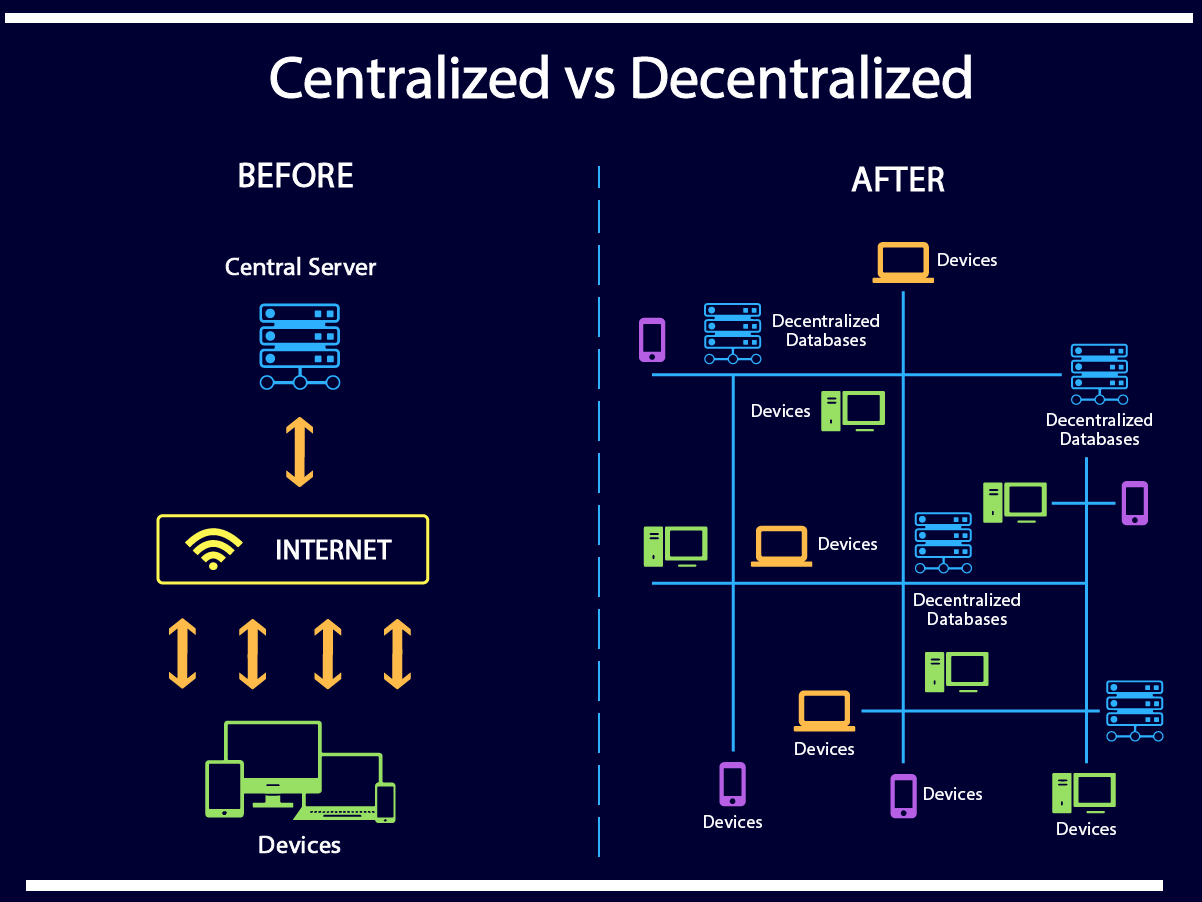DeFi Glossary and Explained

Decentralized Finance (DeFi) is the latest sector emerging in the financial domain. As the name suggests it is decentralized, which means there are no intermediaries, banks, and brokers involved. Therefore, DeFi eliminates the need for any middlemen.
DeFi provides a financial system where the buyers, sellers, lenders, and borrowers interact with each other peer-to-peer. Since, there is no financial institution or intermediary involved, the KYC, Social Security Number, proof of address, or any government-issued ID is not required.
DeFi is growing at a fast pace, providing a financial system which is controlled by masses and not by centralized entities such as banks. The diagram below shows the DeFi market growth since 2017. In Oct 2021, it was around 91,000 million U.S. Dollars.

Traditional vs Decentralized Finance
Where is DeFi used?
- Cross-border or international payments
- To borrow money
- Insurance
- Better digital identity
- Anti-Money Laundering(AML) features
Must Know Terminologies in DeFi:
- DEX(Decentralized Exchanges)
- DAO(Decentralized Autonomous Organization)
- Decentralized applications(dApp)
- Smart Contract
- Liquidity Pools
- Staking
- Stablecoins
What Skills Does a DeFi Developer Need?
Traditional vs Decentralized Finance

| Traditional Finance | DeFi |
| Users are required to share personal data such as government-issued ID, address, social security number, etc. | Users are not required to share personal data with centralized authorities. |
| Intermediary banks, brokers, or financial institutions are involved. | No centralized authority is involved, it is a peer-to-peer financial system managed by software and algorithms. |
| The unbanked users cannot use the services of the bank. | Anyone can borrow, lend, sell, buy and use other services. |
| Transaction clearing and settlement may take a few days. | Transactions are executed in almost real-time. |
| Operating hours are defined, cannot bank outside these days and hours. | Can be accessed and used 24*7. |
Where is DeFi used?
1. Cross-Border or International Payments
The fees on international payments through a traditional banking system are high. These fees can be reduced drastically by using a DeFi. When foreign workers get paid by their companies and they send the money to their home countries, this feature is useful. It helps in saving excess money transfer fees which are levied by the sending, receiving, and intermediary banks.
2. To Borrow Money
If a person is unbanked, i.e. he does not possess a bank account in any bank then he will not be able to borrow or loan money. Sometimes there are restrictions on foreign lands for workers. When a person does not have a permanent address in that country it is impossible to open a bank account. Eventually, that foreign worker cannot borrow money from the bank.
This limitation is removed by the DeFi because there is no requirement to have a bank account or similar. Anyone can borrow from any of his peers, without any involvement of central authority.
3. Insurance
The current traditional insurance system involves tons of paperwork and the customer dreads the claiming procedures due to the lengthy and cumbersome procedures.
The usage of DeFi smart contracts could make these processes much more efficient.
4. Better Digital Identity
Traditional banking system uses credit scores and other digital identities to assess the credibility of a customer. If a customer comes from an unstable financial background, loans and borrowing are impossible with the traditional banking system.
With DeFi, other attributes can be considered for deriving the digital identity, such as financial activities and professional attributes of the person.
5. Anti-Money Laundering(AML) Features
Know-Your-Customer information and standards are crucial for a traditional banking system. DeFi does not rely on KYC for AML purposes, they use Know-Your-Transactions(KYT) instead. Therefore, DeFi relies on the transactional behavior of the customer rather than personal information and identity.
Must Know Terminologies in DeFi:
Below are some glossary terms which will help in understanding DeFi better.
1. DEX(Decentralized Exchanges)
A decentralized exchange (better known as a DEX) is a peer-to-peer marketplace where transactions occur directly between crypto traders.
Examples of DEX: Uniswap, Kyber Swap, OpenSea, Balancer, etc.
2. DAO(Decentralized Autonomous Organization)
DAO stands for decentralized autonomous organization. It can be understood as an open-source blockchain protocol governed by a set of rules. These rules are created by its elected members, this protocol automatically executes certain actions without the need for any intermediaries.
The DAO’s rules are coded into computer programs, which execute themselves based on the behavior or state of the protocol. No interpretation of these program rules is needed, as they are automatically implemented when the coded conditions occur in real-time.
These program rules and subsequent actions are recorded on a blockchain ledger. This ledger is secured and transparent. It cannot be tampered with since it has an immutable timestamp. The distribution of the information to the network participants.
Example of DAO: BTC - Bitcoin network. Read in detail about DAO here.
3. Decentralized applications(dApp)
A dApp is a web service built over the blockchain. These dApps can be used to provide multiple types of web services such as games, chats, social media, etc. However, the most prevalent use of dApps is in DeFi.
4. Smart Contract
Smart contracts are simply computer programs stored on a blockchain that are executed when predetermined conditions are met. With smart contracts in a financial institution’s context, funds can be held, sent, and refunded. These smart contracts are programmed, non-reversible, automated agreements which execute on a blockchain network. They are public and can be audited and examined by anyone.
These smart contracts are faster, efficient, safe, and transparent than traditional financial systems. Read more about smart contracts here.
5. Liquidity Pools
They are the mechanisms through which users pool their assets in smart contracts. It provides the required liquidity to the users to swap the assets between currencies. This crypto liquidity is provided to the users for a share of trading fees by liquidity providers.
Read a detailed article on liquidity pools here.
6. Staking
Crypto staking means locking up a part of the cryptocurrency for a while. This is a way of contributing to the blockchain network. When the stakers lock their cryptocurrency, they earn rewards as tokens or coins. This is quite similar to traditional banking where the depositors earn interest on the money deposited.
7. Stablecoins
Stablecoins cryptocurrency is a solution to limit price fluctuations. These stablecoins are nominally pegged to their underlying assets. The enhanced stability is the reason for making it users’ first choice for purchasing other types of cryptocurrencies.
Example: Tether, it is pegged to US dollars.
Read more about stablecoins here.
What Skills Does a DeFi Developer Need?
As a DeFi developer you may be required to develop the following services:
DeFi token, wallet, exchange, smart contract, DApp, lending platform, staking platform, an art market for NFTs, etc.
For this, a developer requires to know the below areas.
1. Domain and functional knowledge
A strong domain/functional knowledge is required to clearly understand the concepts behind financial terminologies. A DeFi developer should have a core understanding of what is - liquidity, order books, margin trading, insurance, debt, fixed/variable interest rates, Blockchain, Ethereum(ETH), Bitcoin. This knowledge is required to minimise security and functional bugs in the development code.
Following terminologies are specific to DeFi and a developer should have fair understanding of them to have a bright career in DeFi. Smart contracts, stablecoins, decentralized exchanges, decentralized lending, derivatives, ERC20 Tokens and ERC721 Tokens.
2. Programming knowledge
Solidity(for Ethereum Solidity is the main language), Python, Rust, Golang, Typescript.
3. Front-end Development
React.JS, Vue.JS, Mobx, Redux are the popular choices for developing the front end of DeFi applications.
DeFi is the fastest growing financial ecosystem which is independent and widely popular. Big tech companies are building DeFi platforms today and this career option has enormous potential. For a successful career, update your skills and start working towards a great career in DeFi.
Backend Technology Interview Questions
C Programming Language Interview Questions | PHP Interview Questions | .NET Core Interview Questions | NumPy Interview Questions | API Interview Questions | FastAPI Python Web Framework | Java Exception Handling Interview Questions | OOPs Interview Questions and Answers | Java Collections Interview Questions | System Design Interview Questions | Data Structure Concepts | Node.js Interview Questions | Django Interview Questions | React Interview Questions | Microservices Interview Questions | Key Backend Development Skills | Data Science Interview Questions | Python Interview Questions | Java Spring Framework Interview Questions | Spring Boot Interview Questions.
Frontend Technology Interview Questions
HTML Interview Questions | Angular Interview Questions | JavaScript Interview Questions | CSS Interview Questions.
Database Interview Questions
SQL Interview Questions | PostgreSQL Interview Questions | MongoDB Interview Questions | MySQL Interview Questions | DBMS Interview Questions.
Cloud Interview Questions
AWS Lambda Interview Questions | Azure Interview Questions | Cloud Computing Interview Questions | AWS Interview Questions.
Quality Assurance Interview Questions
Moving from Manual Testing to Automated Testing | Selenium Interview Questions | Automation Testing Interview Questions.
DevOps and Cyber Security Interview Questions
DevOps Interview Questions | How to Prevent Cyber Security Attacks | Guide to Ethical Hacking | Network Security Interview Questions.
Design Product Interview Questions
Product Manager Interview Questions | UX Designer Interview Questions.
Interview Preparation Tips
Strength and Weakness Interview Questions | I Accepted a Job Offer But Got Another Interview | Preparation Tips For the Virtual Technical Interview | 7 Tips to Improve Your GitHub Profile to Land a Job | Software Engineer Career Opportunities in Singapore | What can you expect during a whiteboard interview | How To Write A Resignation Letter | Recommendation Letter Templates and Tips.
Quick Links
Practice Skills | Best Tech Recruitment Agency in Singapore, India | Graduate Hiring | HackerTrail Litmus | Scout - Sourcing Top Tech Talent in ONE Minute | About HackerTrail | Careers | Job Openings.






DeFInitely interesting… 🙂